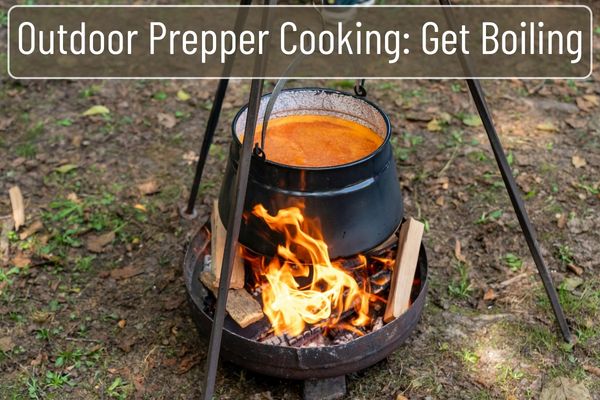In the world today, when most people need something, they buy it with money. And they usually do this at a store.
But what about in a survivalist situation? In a disaster scenario, you won’t just be able to swipe your credit card, tap your phone, or even have cash on hand to buy something. Stores may not be open either.
This is where survivalist barter abilities become so important. You want to be able to trade items and skills you have for things that you need. This will ensure that you and your group remains stocked up, safe, secure, and comfortable.
How Bartering Could Keep You And Loved Ones More Supplied, Secure, And Comfortable
No matter how well prepared you are for an emergency, there will be supplies, food, and equipment that you might not have or need more of. Plus, as an emergency continues, you will probably run out of necessary supplies and food items.
And that’s where bartering could help improve your life and maybe even save it. The extra supplies that you have and the skills that you possess could be good as gold – and maybe even better.
The concept of bartering certainly isn’t new. It’s been done for generations and generations. When money is gone or worthless and the stakes are high (such as after a disaster when you need to do whatever you can to survive), bartering becomes a necessary way of life.
Survivalist barter is useful in challenging times and there are a few things you’ll want to know to do it right.
What are Great Items to Barter?
There are some items that are coveted in nearly every situation and every location. The top items to keep for survivalist barter? Items that people need to stay alive, such as:
:: Water purification supplies (iodine tablets, filters, canteens, etc.)
:: Canned goods
:: Dried beans
:: Rice
:: Honey
:: First-aid supplies
:: Weapons and ammunition
:: Energy sources
:: Tools
:: Durable clothing
There are also comfort items that nearly everyone desires, especially when living in difficult conditions. These items that provide a bit of extra comfort can help improve one’s mood and lift one’s spirits. Some of these items are:
:: Toiletries (soap, shampoo, toothpaste, etc.)
:: Coffee
:: Alcohol and cigarettes
:: Snack foods (chips, candy bars, chocolate, etc.)
Of course, you can’t predict the future or who you’ll run into, so you won’t ever know exactly what others will need. You’ll also need to be aware that you can’t carry or store unlimited items, so you may want to prioritize the things you and your group actually need. Once you have those, decide if you can keep a few extras on hand that can work well for survivalist barter.
It really depends on your living situation, the size of your group, and your circumstances. You can’t exactly carry an entire department store on your back if you’re living in a small tent with three other people, nor should you try.
Do You Have Valuable Skills and Knowledge? Barter with Them, Too!
Do you know how to construct an effective water filtration system? Can you repair certain kinds of machinery? Are you a doctor skilled in first aid or a skilled in teaching hunting or trapping? Any of these skills could be potentially valuable assets used to barter.
How to Protect the Assets you Might Use for Bartering?
The best assets to barter are also, in many cases, the most desired by others. This is what makes them great for trade, but it also increases the chances of them getting the attention of thieves.
Don’t carry more than you can safely secure. Yes, it would be great to have enough food and supplies to trade for whatever you need, but that’s probably not realistic. You need a place to securely store your items. If you can’t do this, consider trading away the things you can’t protect. At least you’ll get something for them rather than have them lost or stolen.
Have a designated storage area that is out of site, dry, and as safe as possible (both from other people and from animals, insects, etc.). Remember that you need to keep your supplies safe from both others and the elements.
Negotiating to Get Your Group What It Needs
Oftentimes, bartering isn’t easy. Even if you’re making a fair trade, other people may hesitate to give up something they have. This is why negotiating is so important.
:: Be clear
When negotiating, it’s important to be clear with what you have and what you’re looking to receive. This helps avoid misunderstandings.
:: Have respect
Remember that everyone out there is looking to survive. Treat others with respect and courtesy.
:: Know when to walk away
Recognize the value of what you have and what you’re looking to receive. If the trade doesn’t seem fair or the situation seems unsafe, know how to respectfully walk away.
Not all survivalist barter is an adversarial relationship. Often, you’ll make trades with those in your community or those you encounter often. For instance, in a mass power outage, you may barter with those who are near you to maximize food usage. If you have a large supply of apples, for instance, but no milk, there may be someone nearby who is in the opposite situation. Rather than living entirely off apples while the person down the road watches their milk spoil, why not exchange some of your apples for some of their milk?
In this scenario, everyone is happy, and nothing spoils or goes to waste. Situations like this one show why it’s important to build connections, work with other survivalists, and create essential trade networks when possible.
Bartering Win/Win Agreements
No one wants to feel like they lost a deal. While you obviously don’t want to give up more than you have to when you’re bartering, you also don’t want to leave the other person or group feeling cheated. Why make another enemy unnecessarily?
This doesn’t mean the value of everything you barter has to be equal, but you should strive to make sure that things are fair. Never forget that survivalist barter is about two sides who both want what’s best for their groups. By negotiating with respect and being fair and honest in your dealings, you’ll give your group the best chance to survive and thrive.




